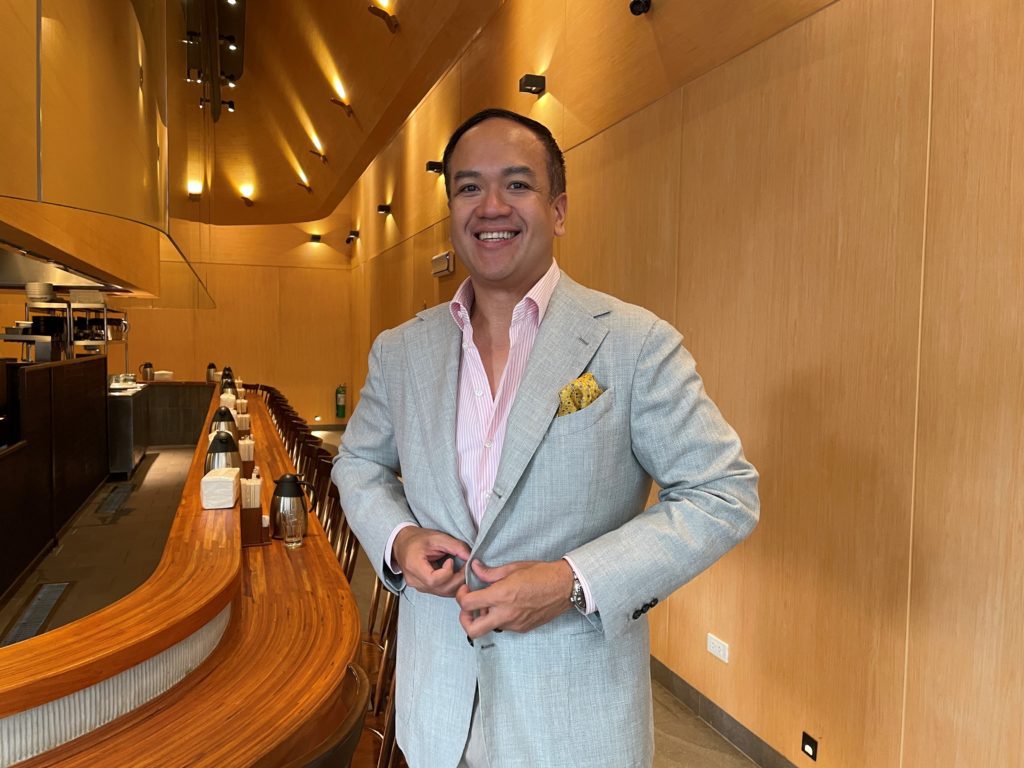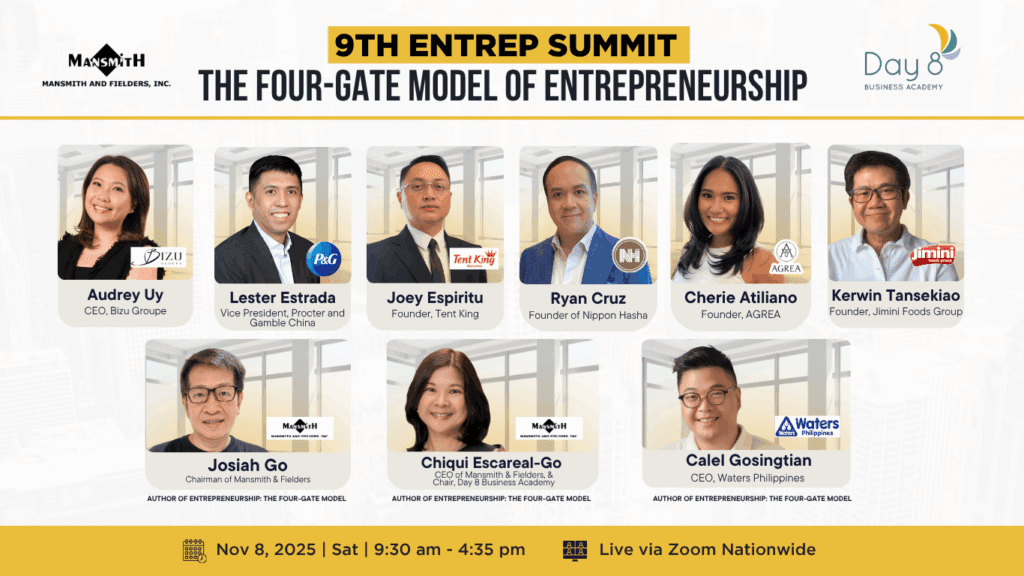
Ryan K Cruz is the Founder and CEO of Nippon Hasha, composed of Ramen Yushoken and Mendokoro Ramenba, food establishments that have been attracting long lines of quality-conscious customers. Ryan spoke in the 5th Entrep Summit organized by Day 8 Business Academy, and Mansmith and Fielders Inc. about facing adversities during Covid-19 and how they emerged stronger afterwards. His talk, along with five others, are available for free at Day 8 Business Academy’s website www.day8.org.
Q1: Your restaurants are known for your hardcore “no take out” or “no take home” policy, why is this important to the customer experience?
A1: It’s important because of what happens to the product when they experience it in a manner that is substandard and does not represent our brand. The control and precision of temperature in the F&B business means the difference between wonderful and disappointing. While it might be more convenient for a lot of people especially with our lines, they are effectively getting a devalued product.
For the brand it is critical as well as customers will remember us from their last experience. Maintaining the integrity of our product doesn’t just manifest itself in these occasions. For example if your bowl arrived and you had to take a call outside, when you come back we will tell you that we’re replacing it as we can’t let you have a diminished experience.
Q2: You pivoted from “no take out” to take home kit only 9 days from the first lockdown, 2 months ahead of your competitors. Do you think this is consistent with your brand DNA?
A2: Absolutely. Having the Take Home Kits at a time when people couldn’t physically go out gave them a chance to replicate what we do for them in their own homes. Selling it as a finished product would permanently alter it where the quality would be irrecoverable.
Q3: You put out a social media notice of the availability of your take home kit during the first Covid-19 lockdown. Tell us what happened after?
A3: We came up with the Take Home Kit just 9 days after the lockdown. The fact that we had no structure for takeout makes it even an even more proud moment for us when I look back at it, and that’s really a testament to the spirit of the team.
I had the messenger accounts of both brands, Ramen Yushoken and Mendokoro Ramenba open when I told my EA to upload the photo. Barely a minute after, the orders came streaming in and it was pretty much like someone had turned on a gushing faucet. Many people were in fact already sleeping when we announced it and when they woke up the next day, they immediately placed an order. This made them quite irate as they were thinking that they were one of the first to order. What they didn’t realize was that from 10pm to 7am the next day, we received 22,000 orders! The minute the orders came streaming in, I knew we couldn’t fulfill all the others on time and that’s why we posted an apology right away. It was certainly an interesting time and that one product powered us through a tough time and still continues to be a significant percentage of our revenue, as well as allowing us to build data on where are our customers are from.
Q4: Why do you think companies like yours should make money in the buying function and not just in the selling of products?
A4: People think that the magic of a restaurant happens when a customer comes in, eats and pays for the bill. You don’t actually make the profit when you sell something, but rather when you buy your products. You “buy” profit, you don’t “sell” profit.
It’s a critical lesson restaurant owners often forget, to concentrate on their value chain. When you reduce businesses to its granularity, what you’ll find is that the retail fronts only compete in terms of the consistency of experience. It’s the value chains that compete with each other. The price of your suppliers determines the price of your service.
Q5: You are great believer about Return on Relationship, in fact, you measure it in your company. Can you share with us about this employee metric and why it is critical?
A5: Ultimately Relationships lead to Engagement, one of the two biggest things that drive a business, aside from money. Engagement is defined as the mental and emotional connection people have with their work, team and organization. It decides the difference of whether someone is giving 100% of themselves rather than in situations where a disengaged worker is only putting out 30-50%, or whatever the bare minimum is to avoid being terminated.
100% of your employees, customers and competitors are human beings. When you reduce the problems of any business down to its essence, they are essentially people problems. If you don’t take the time to fully understand how they work and establish real, human relationships, you are missing out on a huge competitive advantage.
Is it difficult taking the time to do this? Yes it is but not only is it morally right and good for the long game but is a better set of “problems” to have rather than low output due to disengagement, higher manpower costs via turnover, and will be constantly be fighting fires.
Q6: You removed job description in your company. Tell us what made you do that.
A6: Job descriptions can oftentimes be generic and vague, not only to the organization, the team and also to the individuals themselves. What we’ve done is take that all away and instead replaced them with Accountabilities. Like for example, as the CEO, my Accountabilities include Big Relationships, People, Culture, and Negotiations. For admin policies or processes, it’s another person as well. So anytime anything falls under those, people know exactly who the guy to look at and look for.
You can delegate Responsibilities but as the saying goes, if everyone is Accountable for something, then no one is. The other benefit is that it increases an individual’s relevance in their team, which is critical to employee satisfaction. It answers the question, if you were not in the room (with your team), what would be missing?
Q7: Beyond growing your business, how do you build the culture of your company? What is your company culture?
A7: A group of people such as a business organization will always be nothing more than a group of normalized averages. Our “normalized average” are people who are with us because they have a passion for service, people and results, while making all our decisions considering the humanity in everyone.
Achieving and maintaining that is being careful about who you hire, myself being the CRO or “Chief Reminding Officer” about our Mission, Values and Purpose, and always being persistent about open communication. I know people think that this is fluff, and I used to as well before I saw what a huge effect it had when people knew how they were expected to behave and act, and matching their day to day activities with it.
Anything that requires a certain level of output means that your standards will never be dependent on what you say it is, but rather what you tolerate. Therefore it is not decided by your highest performer, but your lowest.
In the end, our culture is not what I or we say it is. It’s what our guys say around the dinner table when they are asked “How is your job?”
*****
Josiah Go is Chairman and Chief Innovation Strategist of Mansmith and Fielders Inc.
See more articles on Marketing.
Want to win in business? Start by leading yourself.
Catch Ryan at the 9th Mansmith Entrep Summit on November 8, 2025, as he shares “Lead Yourself First: The Inner Game of Entrepreneurial Success.”
Plus—get a FREE copy of the #1 best-selling entrepreneurship book of 2024, Entrepreneurship: The Four-Gate Model (by Josiah Go, Chiqui Escareal-Go, and Calel Gosingtian), when you join the summit!
Learn more & register now: bit.ly/9thEntrepSummit.


